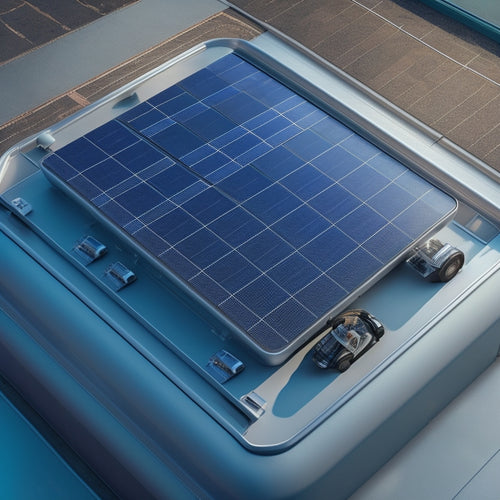
Solar Solutions for Homes to Reduce Energy Bills
Share
By utilizing sunlight, you can reduce your energy bills by up to 50% with customized solar solutions. Solar energy systems offer a range of benefits, including a decreased reliance on non-renewable sources, no emissions or pollution, and lower energy bills. With various installation options, including roof-mounted and ground-mounted systems, you can find a solution that suits your needs. Plus, government incentives and tax credits can help offset installation costs. As you investigate the world of solar energy, you'll uncover more ways to maximize your energy savings and minimize your carbon footprint – and that's just the beginning of your solar expedition.
Key Takeaways
- Solar energy systems reduce energy bills by generating electricity on-site, with eligible homeowners receiving government incentives and tax credits.
- High-efficiency solar panels convert sunlight into electrical energy, producing no emissions or pollution during operation, and requiring minimal maintenance.
- Roof-mounted, ground-mounted, and building-integrated solar panel installations cater to different home designs and energy needs, offering flexibility and convenience.
- Financing options, community solar programs, and solar leasing make solar energy accessible and affordable for homeowners, reducing upfront costs and increasing adoption.
- Solar energy storage solutions, such as solar batteries, enable homeowners to store excess energy for use during non-sunny periods, promoting energy independence and reducing carbon footprint.
Benefits of Solar Energy Systems
As you contemplate transitioning to a more sustainable and environmentally friendly energy solution, it's vital to understand the benefits of solar energy systems. One notable advantage is the reduction of your reliance on non-renewable energy sources, decreasing your carbon footprint and contributing less to climate change.
Solar energy systems offer a clean and green alternative, producing no emissions or pollution during operation. This leads to a considerable positive environmental impact, as you'll be reducing your contribution to air and water pollution.
Another important benefit is the financial advantage. Solar energy systems can greatly lower your energy bills, as you'll be generating your own electricity.
You'll also benefit from government incentives and tax credits, which can help offset the initial installation cost. Additionally, solar energy systems require minimal maintenance, and their durability guarantees a long lifespan, typically ranging from 25 to 30 years.
How Solar Panels Work Efficiently
By utilizing the sun's energy, solar panels convert sunlight into electrical energy through a photovoltaic (PV) process. This process involves the excitation of electrons in silicon cells, which generates an electrical current. As you consider installing solar panels, it's crucial to understand how they work efficiently to maximize your energy savings.
The solar panel efficiency depends on various factors, including the type and quality of photovoltaic technology used. High-efficiency solar panels can achieve up to 22% conversion rates, while standard panels typically range from 15% to 18%.
To optimize energy production, solar panels are designed to absorb sunlight across a broad range, minimizing heat loss and maximizing electrical output.
When you install solar panels, you can expect them to operate at peak efficiency during peak sunlight hours. However, even on cloudy days, solar panels can still generate significant amounts of energy.
Types of Solar Panel Installations
You've got several options when it comes to installing solar panels on your home, each with its own set of benefits and considerations.
Roof mounted systems are the most common, where panels are installed directly on your roof. Ground mounted systems, on the other hand, involve installing panels on the ground, often in an open area like a backyard.
Solar carports are another option, providing both shade and electricity for your vehicle. Building integrated photovoltaics (BIPV) integrate solar panels into your home's design, making them a sleek and modern choice.
Hybrid solar installations combine solar with other power sources, like wind or battery storage, for a reliable energy supply. If you're looking for off-grid solutions, you can opt for portable solar generators or community solar projects, which allow multiple homeowners to share the benefits of solar energy.
Some installations also employ solar tracking systems to maximize energy output, while others use thin film technology for increased efficiency.
With these options, you're sure to find a solar solution that fits your energy needs and budget.
Cost-Effective Solar Energy Options
Energy-conscious homeowners often prioritize cost-effectiveness when moving to solar power.
You're likely no exception, seeking affordable solar solutions that deliver considerable residential savings. One essential factor to evaluate is installation costs, which can vary depending on the size and complexity of your system.
Fortunately, financing options are now more accessible than ever, making solar energy more attainable for homeowners like you.
Community solar programs, solar leasing, and net metering are just a few alternatives to traditional ownership models.
These innovative approaches can greatly reduce upfront costs, making solar energy more affordable for a wider range of homeowners.
Solar co-ops, where multiple individuals or organizations pool resources to invest in a shared solar array, are another option worth exploring.
Solar Incentives and Rebates Available
Your investment in solar energy can pay off even more with the various incentives and rebates available. You can take advantage of federal incentives, such as the Solar Investment Tax Credit (ITC), which allows you to claim a tax credit of 26% of the total cost of your solar panel system.
Additionally, many states offer rebates and tax credits to encourage the adoption of solar energy. You may also be eligible for solar grants, which provide funding for solar panel installations.
Utility programs, such as net metering, can also help you save money by crediting you for excess energy produced by your solar panels. Financing options, like solar leasing and power purchase agreements, can make it more affordable to install solar panels.
Low-income assistance programs are also available to help make solar energy more accessible to everyone. Moreover, community solar programs allow you to benefit from solar energy even if you can't install panels on your property.
Lastly, many states offer property tax exemptions, which can help reduce your property taxes after installing solar panels. By taking advantage of these incentives, you can greatly reduce the upfront cost of going solar.
Energy Efficiency With Solar Power
Frequently, homeowners overlook the fact that solar power systems not only generate clean energy but also increase their home's energy efficiency. By installing solar panels, you can optimize your energy consumption and reduce your reliance on the grid.
With net metering, you can even sell excess energy back to the utility company, offsetting your energy bills. Solar leasing and community solar programs offer affordable options for homeowners who want to shift to solar power without breaking the bank.
Investing in solar power means investing in energy independence. You'll reduce your carbon footprint and contribute to a cleaner environment.
Additionally, solar education and home automation can help you monitor and control your energy usage, identifying areas for improvement. Residential incentives and solar financing options make it easier to get started.
Utility partnerships can also provide additional benefits, such as priority maintenance and repair services. By utilizing the power of solar energy, you'll not only reduce your energy bills but also increase your home's value and contribute to a sustainable future.
Solar Energy Storage Solutions
Solar batteries and other storage solutions play an essential role in maximizing the benefits of your solar power system, allowing you to employ the full potential of renewable energy.
By integrating advanced battery technologies with your solar inverters, you can store excess energy generated during the day for use during the night or on cloudy days. This renewable integration enables you to reduce your reliance on the grid and achieve energy independence.
With home automation capabilities, you can monitor and control your energy usage in real-time, optimizing your energy management. For those looking to go off-grid, hybrid systems combining solar and energy storage provide a reliable and efficient solution.
Smart charging capabilities also guarantee that your batteries are charged when energy is abundant, reducing your energy bills. In addition, advancements in battery lifespan have made energy storage a viable long-term investment.
Installation and Maintenance Tips
When planning the installation of your solar power system, it's vital to assess your roof's structural integrity and confirm it can support the weight of the panels.
You should also verify that the installation site receives adequate sunlight and is free from shading obstructions. During installation, follow installation best practices to guarantee a safe and efficient process.
Post-installation, regular maintenance is important to optimize your system's performance.
Create a maintenance schedule to clean your solar panels regularly, as dirt and debris can reduce energy output.
Check for loose connections and inspect your system's electrical components to prevent malfunctions.
Additionally, inspect your roof for signs of wear and tear, making sure that the solar panels remain securely fastened.
Monitoring Solar Energy Performance
You'll want to keep tabs on your solar energy system's performance to guarantee it's running at its best.
To do this, you'll need a way to track your energy production, access real-time performance data, and receive system health alerts.
Energy Production Tracking
Tracking your solar energy system's performance in real-time helps guarantee it operates at peak efficiency.
You'll be able to identify any issues promptly, minimizing downtime and maximizing energy production.
Modern tracking software innovations enable you to monitor your system's performance remotely, providing detailed observations into your energy consumption patterns.
This data allows you to optimize your energy usage, reducing waste and saving you money on your energy bills.
Real-Time Performance Data
With your solar energy system connected to modern monitoring software, real-time performance data is at your fingertips. You can access detailed observations into your system's operation, allowing you to identify opportunities for performance optimization. This level of transparency enables you to make data-driven decisions to maximize your energy production and reduce your energy bills.
| Metric | Description | Benefits |
|---|---|---|
| Energy Production | Real-time tracking of energy output | Identify underperforming panels or strings |
| System Efficiency | Monitor system performance ratios | Optimize system configuration for maximum output |
| Environmental Impact | Track carbon emissions reduction | See the positive impact of your solar investment |
With real-time analytics, you can monitor your system's performance and make adjustments to optimize energy production. This level of control enables you to take full advantage of your solar energy system, reducing your reliance on the grid and maximizing your energy savings. By leveraging real-time performance data, you can reveal the full potential of your solar energy system and enjoy the benefits of clean, renewable energy.
System Health Alerts
Vigilance is key to guaranteeing your solar energy system operates at peak performance. You need to stay on top of its condition to maximize energy production and reduce energy bills. That's where system health alerts come in.
These alerts are an essential part of your solar energy system's monitoring capabilities, providing you with real-time notifications when something goes awry.
Through advanced system diagnostics, your solar energy system can detect potential issues before they become major problems. Performance alerts notify you instantly if there's a drop in energy production, allowing you to take prompt action to resolve the issue.
This proactive approach guarantees your system operates at peak levels, minimizing downtime and energy losses.
Future of Solar Energy Technology
You're likely wondering what's on the horizon for solar energy technology.
Advancements in energy storage, more efficient panel designs, and progress toward grid parity are all expected to play a significant role in shaping the future of solar energy.
As you investigate these emerging trends, you'll gain a better understanding of how they'll impact the adoption and effectiveness of solar solutions for homes.
Energy Storage Advancements
Energy storage advancements are revolutionizing the future of solar energy technology, enabling homeowners to harness the sun's power more effectively than ever before.
With battery innovation at the forefront, you can now store excess energy generated during the day for use during peak hours, reducing your reliance on the grid and minimizing peak shaving.
Smart charging systems optimize energy storage, guaranteeing you're using renewable sourcing whenever possible. This seamless home integration also enables you to monitor and control your energy usage in real-time, making it easier to reduce your environmental impact.
As you investigate scalability options, consider hybrid systems that combine solar with other power sources, providing a reliable and efficient energy solution.
When evaluating energy storage systems, perform a lifecycle analysis to confirm the technology you choose aligns with your long-term goals and budget.
Efficient Panel Designs
With the rise of energy storage, efficient panel designs have taken center stage in the future of solar energy technology. You're likely to notice a significant shift towards innovative materials that enhance panel performance while reducing costs.
For instance, bifacial panels that capture energy from both sides of the panel are becoming increasingly popular. These panels can increase energy output by up to 25%, making them an attractive option for homeowners looking to maximize their energy production.
Another area of focus is panel aesthetics. You'll find that modern solar panels are designed to be sleek and visually appealing, blending seamlessly into your home's design.
Thin-film panels, in particular, offer a more subtle look that many homeowners prefer. Additionally, building-integrated photovoltaics (BIPV) are being integrated into roofing materials, allowing you to generate energy while maintaining a traditional roofline.
As panel designs continue to evolve, you can expect even more efficient and attractive options to emerge, making solar energy an even more intriguing choice for your home.
Grid Parity Progress
As solar power costs continue to plummet, the industry inches closer to achieving grid parity, where solar energy becomes cost-competitive with fossil fuels. You're likely to benefit from this trend, as the cost of solar energy decreases.
Grid parity trends indicate that solar energy will soon be on par with traditional energy sources, making it a more viable option for homeowners.
The solar market fluctuations are shifting rapidly, driven by advancements in technology and economies of scale. You'll notice that the cost of solar panels has dropped considerably over the past decade, making solar energy a more attractive option for those looking to reduce their energy bills.
As the industry approaches grid parity, you can expect to see even more innovative solutions emerge, further driving down costs and increasing adoption rates.
With grid parity on the horizon, it's an exciting time for homeowners looking to utilize the power of solar energy. You'll soon have the opportunity to tap into a clean, renewable energy source that's not only good for the environment but also for your wallet.
As the industry continues to evolve, you can expect to see even more affordable and efficient solar solutions for your home.
Frequently Asked Questions
Can I Install Solar Panels on My Own or Do I Need a Professional?
You can attempt a DIY installation, but be aware that safety regulations and complex electrical connections require proficiency, so it's highly recommended that you hire a professional to guarantee a safe and efficient solar panel installation.
Are Solar Panels Resistant to Extreme Weather Conditions Like Hail?
Can you imagine your solar panels withstanding a brutal hailstorm? You'll be relieved to know that most panels are designed with hail resistance and weather durability in mind, withstanding impacts up to 25mm hailstones at 23m/s.
Can I Use Solar Energy to Power My Electric Vehicle?
You can utilize solar energy to power your electric vehicle through solar charging, integrating your EV's charging station with your home's solar panel system, allowing you to fuel up on clean energy and reduce your reliance on the grid.
Do Solar Panels Require Regular Cleaning to Maintain Efficiency?
You'll want to clean your solar panels regularly to maintain their efficiency; experts recommend cleaning every 6-12 months, depending on location and environmental factors, as part of your overall solar panel maintenance to guarantee ideal energy harvesting.
Will Solar Panels Increase the Value of My Property?
Let's get real, you're not just looking for a sweet Instagram-worthy addition to your roof, you want a solid investment. And, spoiler alert, solar panels deliver! They'll enhance your property appraisal and provide serious investment benefits, making your home (and wallet) shine brighter than those panels on a sunny day.
Related Posts
-

Top Solar Panels for Car Battery Maintenance
When selecting top solar panels for car battery maintenance, consider high-efficiency models with high wattage output...
-

3 Best State and Local Solar Incentives USA
You can greatly reduce your energy dependence and save thousands of dollars by taking advantage of the top state and ...
-

Planning for an Electric Vehicle-Friendly Urban Future
As you plan for an electric vehicle-friendly urban future, you'll need to integrate high-power charging stations, sma...


